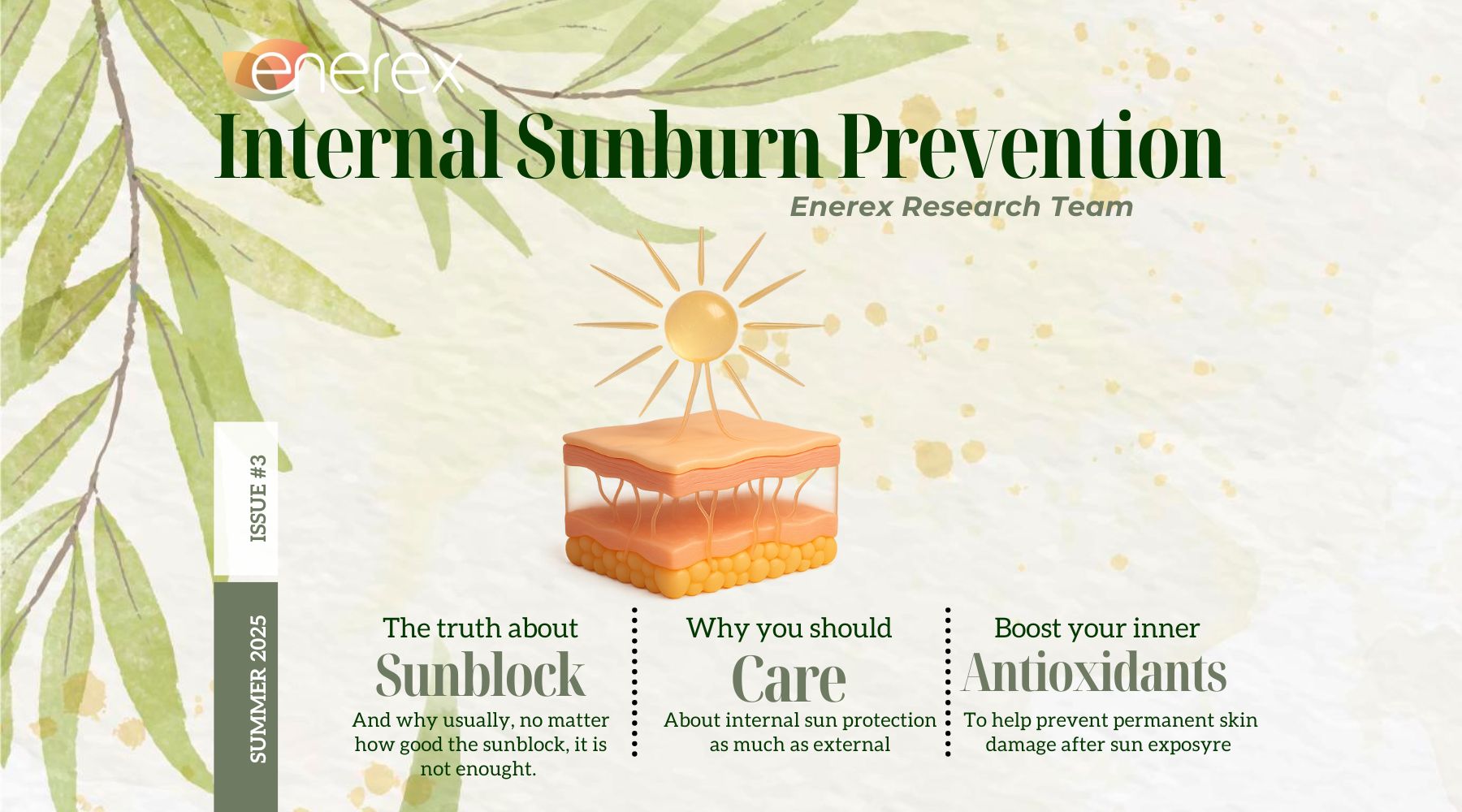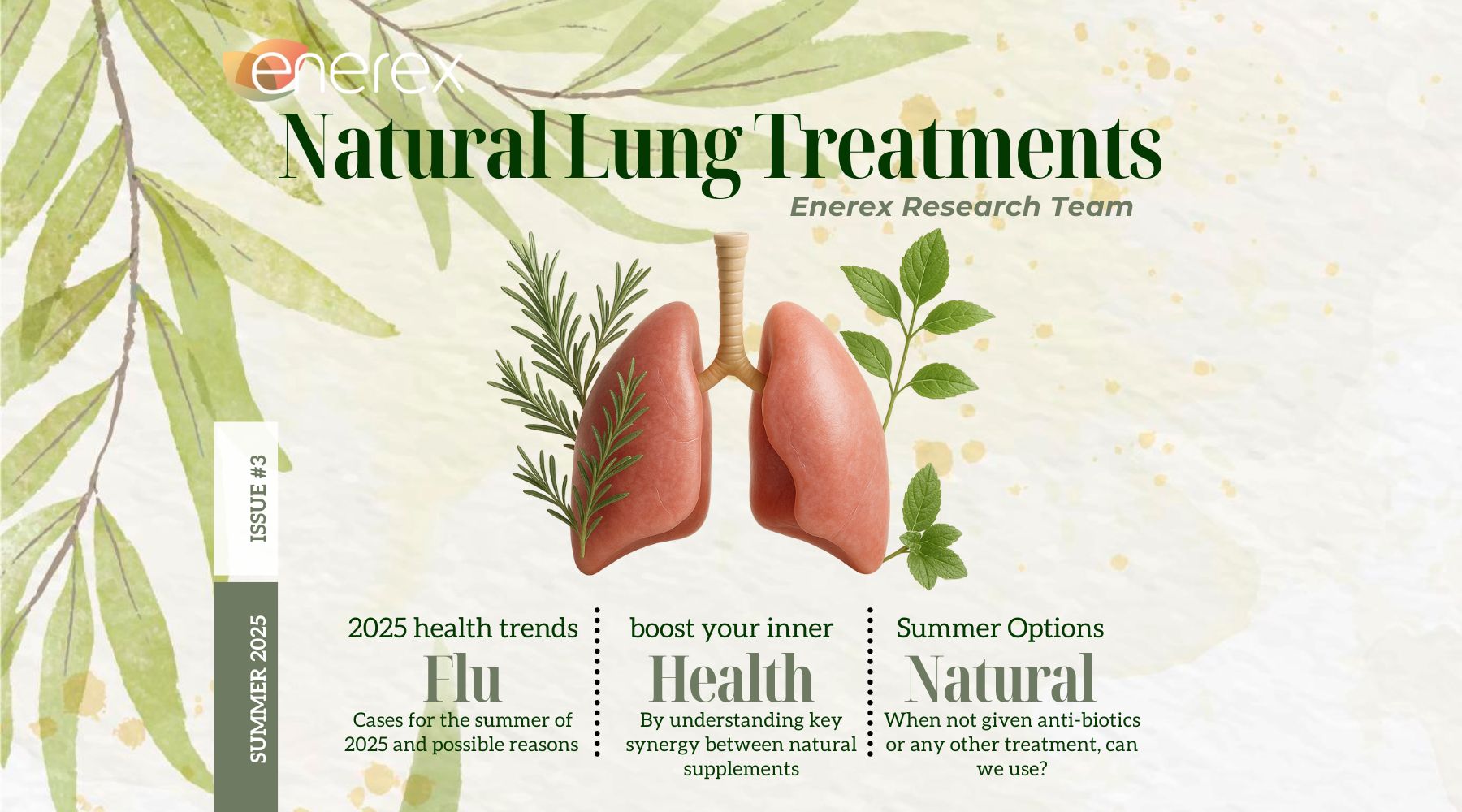Health Support For Summer Flu

Quick Links
Natural Support for Respiratory Infections – Summer 2025 Update
Respiratory infections, ranging from common colds and seasonal flu to lingering COVID-19 and bacterial infections like Mycoplasma pneumoniae, remain an ongoing concern—especially in travel, camp, and crowded environments, even during the quieter summer months. While most cases are mild, recovery can take time, and symptoms like cough, fatigue, and lung inflammation often persist long after the initial infection clears.
In this context, many are exploring evidence-informed, natural options to support the body’s healing processes—alongside standard medical treatment. Below, we highlight a few key natural agents being studied or used in clinical practice to aid respiratory recovery:
Natural Compounds for Symptom Support and Healing
N-acetylcysteine (NAC) is a powerful antioxidant and precursor to glutathione. Known to support detoxification and help eliminate toxins from the liver, lungs, intestines, and kidneys. Waste build-up naturally occurs through cellular metabolism.
Vitamin C and Stress: The Adrenal Connection
When the body is under stress—whether from emotional strain, illness, or physical demands— vitamin C becomes a critical nutrient . The adrenal glands, responsible for producing stress hormones like cortisol and adrenaline, contain some of the highest concentrations of vitamin C in the body. Here's why:
Vitamin C supports hormone synthesis by acting as a cofactor for enzymes that produce adrenal hormones
It protects adrenal tissue from oxidative stress, which increases during infection or chronic stress
It regulates cortisol output, helping to prevent burnout and buffer against the negative effects of prolonged stress
During illness or infection—especially with lung involvement—the body's demand for vitamin C increases. This is why vitamin C depletion is common in pneumonia and other serious respiratory infections . Replenishing it supports both adrenal recovery and overall immune function.
Vitamin C and Immune Function
Vitamin C and Stress: The Adrenal Connection
When the body is under stress—whether from emotional strain, illness, or physical demands— vitamin C becomes a critical nutrient . The adrenal glands, responsible for producing stress hormones like cortisol and adrenaline, contain some of the highest concentrations of vitamin C in the body. Here's why:
Vitamin C supports hormone synthesis by acting as a cofactor for enzymes that produce adrenal hormones
It protects adrenal tissue from oxidative stress, which increases during infection or chronic stress
It regulates cortisol output, helping to prevent burnout and buffer against the negative effects of prolonged stress
During illness or infection—especially with lung involvement—the body's demand for vitamin C increases. This is why vitamin C depletion is common in pneumonia and other serious respiratory infections . Replenishing it supports both adrenal recovery and overall immune function.
Vitamin C and Immune Function
Vitamin C plays a foundational role in both innate and adaptive immunity :
Antioxidant Defense: It neutralizes free radicals and shields immune cells from oxidative stress
Epithelial Barrier Protection: Vitamin C strengthens the skin and mucosal barriers that prevent pathogen entry—especially important in the lungs
Immune Cell Activation: It enhances neutrophil migration, phagocytosis, and microbial killing while limiting tissue damage
T & B Cell Support: Vitamin C promotes lymphocyte growth and function, crucial for adaptive immune response and long-term immunity
During infections, higher metabolic demands increase the need for vitamin C—making supplementation more relevant for immune resilience and faster recovery.
Vitamin C for Lung Infections: Science-Backed Support
Respiratory infections like colds, flu, and pneumonia often deplete vitamin C levels. Evidence supports its role in:
Preventing & Managing Pneumonia: Doses ≥200 mg/day may reduce pneumonia incidence and severity. Patients with pneumonia often have very low plasma vitamin C levels, and repletion improves outcomes
Antiviral Action in the Lungs: Vitamin C boosts antiviral gene expression and helps lung cells resist viral replication, inflammation, and tissue injury
Reducing Severity: Low vitamin C levels correlate with more severe symptoms. Supplementation can reduce hospital stays and aid recovery
In short, vitamin C isn’t just immune support—it’s also a protector of lung tissue.
Vitamin C for Lung Infections: Science-Backed Support
Effective 1:1 combination of Vitamin C and Citrus Bioflavonoids for enhanced absorption and bioavailability. Vitamin C is for more than just the common cold.
Bioflavonoids & Hesperidin: Vitamin C’s Powerful Partners
Bioflavonoids are plant-based compounds that enhance and complement the effects of vitamin C . Commonly found in citrus fruits, they include hesperidin, quercetin, and rutin.
Key Benefits:
Increase vitamin C absorption and stability
Provide antioxidant and anti-inflammatory support
Support immune modulation through improved antibody response and reduced cytokine activity
Hesperidin, in particular, has shown the ability to reduce inflammatory cytokines and support immune defense during viral infections. Studies suggest it may help reduce immune cell depletion and protect the lungs from excessive inflammation.
Quick Reference: How Each Nutrient Supports Immunity and Lung Recovery
| Nutrient | Immune & Stress Effects | Respiratory & Recovery Benefits |
|---|---|---|
| Vitamin C | Boosts immune cell function, supports adrenal hormone synthesis, reduces oxidative stress | Enhances lung antiviral defense, reduces pneumonia severity |
| Bioflavonoids | Increase vitamin C activity, reduce inflammation, support capillary strength | Protect lungs from infection-related damage, speed healing |
| Hesperidin | Modulates immune response, increases antibodies, reduces cytokine overload | May lower lung inflammation in viral and bacterial infections |
Conclusion: Targeted Nutrients for a Stronger Recovery
Vitamin C is not just a cold-fighting classic—it’s a key player in adrenal health, immune function, and lung protection , especially during and after respiratory infections. When paired with synergistic compounds like bioflavonoids and hesperidin , it offers broad-spectrum support that goes beyond prevention and into true recovery.
Whether you're managing a post-viral cough, navigating a seasonal infection, or supporting long-term immune health, these nutrients are essential tools in your recovery kit —but always check with your healthcare provider before beginning any new supplement protocol.
Carvacrol , the primary bioactive compound in Oil of Oregano , has been extensively studied for its powerful antimicrobial, anti-inflammatory, and antioxidant properties. It plays a valuable role in supporting the respiratory system, particularly during and after infections, where microbial imbalance, inflammation, and mucus buildup can delay recovery.
Key Mechanisms of Action:
Broad-Spectrum Antimicrobial: Carvacrol exhibits activity against a wide range of bacteria (including Streptococcus pneumoniae, Haemophilus influenzae, and Mycoplasma pneumoniae), viruses (including RSV and influenza), and fungi (Candida albicans), making it a versatile agent for upper and lower respiratory tract infections.
Biofilm Disruption: It has demonstrated the ability to disrupt bacterial biofilms—protective layers that pathogens form to resist treatment—enhancing the effectiveness of the immune system and antimicrobial therapies.
Anti-Inflammatory Effects: Carvacrol inhibits inflammatory mediators like COX-2, IL-1β, TNF-α, and nitric oxide, helping reduce tissue inflammation in the airways and lungs.
Mucolytic Properties: It supports the breakdown of thick mucus, promoting easier breathing and more efficient lung clearance.
Clinical Implications for Respiratory Infections:
During acute infection: Carvacrol may support the body’s ability to suppress microbial growth, reduce airway inflammation, and limit the spread of pathogens.
Post-infection recovery: Oil of oregano may assist in clearing residual microbial imbalances and preventing secondary infections, particularly after antibiotic use.
Immune modulation: By regulating the inflammatory response, carvacrol helps reduce tissue damage without suppressing immune activity.
Usage Considerations:
Oil of oregano is best used in short, therapeutic intervals under professional supervision, especially in concentrated forms or capsules.
It is generally not recommended for long-term daily use due to its potency and potential impact on gut microbiota.
Should be avoided or used cautiously in children, pregnancy, and individuals with known sensitivity to mint-family plants.
Black Seed Oil (Nigella sativa): Anti-Inflammatory and Immune Balancer
Black Seed Oil , derived from Nigella sativa, has been used in traditional medicine for centuries. Its active component, thymoquinone , is a powerful anti-inflammatory, antioxidant, and immune modulator.
Immune-Enhancing Properties:
Immune Regulation: Balances Th1/Th2 responses and increases natural killer (NK) cell activity, improving the body’s ability to fight viruses while minimizing autoimmune flare-ups.
Antioxidant Support: Scavenges reactive oxygen species (ROS), protecting lung tissue from oxidative damage after infection.
Anti-Histaminic Action: Useful in allergy-related respiratory issues, helping reduce histamine release and easing bronchial irritation.
Lung-Specific Benefits:
Bronchodilatory Effects: Supports easier breathing by relaxing smooth muscle in the airways.
Reduces Lung Inflammation: Studies in asthmatic and COPD models show that thymoquinone reduces inflammatory markers and improves airflow.
Post-Viral Support: May assist in calming residual inflammation and restoring immune balance after viral infections or prolonged illness.
Black seed oil also supports glucose regulation, liver detoxification, and immune readiness —making it particularly valuable for individuals with underlying inflammation or chronic disease.
Quick Reference Table: How These Compounds Support Respiratory Health
| Nutrient/Compound | Key Mechanism | Respiratory Benefit |
|---|---|---|
| Calcitriol (Vit D) | Enhances antimicrobial peptides, modulates immune response, protects barriers | Reduces infection severity, lowers cytokine storm risk, protects lung tissue |
| Carvacrol (Oregano) | Broad-spectrum antimicrobial, anti-inflammatory, mucolytic | Clears pathogens, reduces congestion, supports post-infection lung health |
| Black Seed (TQ) | Antioxidant, anti-inflammatory, Th1/Th2 modulator | Eases breathing, balances immune response, reduces post-viral inflammation |
Synergistic Support for a Resilient Respiratory System
When used appropriately and under professional guidance, Calcitriol, Oil of Oregano, and Black Seed Oil offer distinct and complementary mechanisms to support the immune system during and after respiratory infections. Their benefits extend from acute defense to long-term lung resilience and inflammation control.
Together with nutrients like Vitamin C and bioflavonoids , these compounds form a holistic respiratory recovery toolkit —ideal for supporting those recovering from seasonal viruses, lingering post-infection symptoms, or chronic respiratory inflammation.
Enerex Black Oregano is a premium herbal remedy combining potent wildcrafted oregano oil 40% (from Origanum vulgare, a member of the Lamiaceae family) with 60% certified organic Black Seed Oil. This synergistic blend is enhanced with Vitamin A and Vitamin D3 to provide advanced support for the immune system and the maintenance of good health. Designed to help the body combat free radicals, this formula assists with effective relief at the first sign of flu symptoms, sore throat, or skin infections.
Serrapeptase: Enzyme Support for Inflammation, Mucus Clearance, and Lung Recovery
Serrapeptase (Serratiopeptidase) is a proteolytic enzyme originally derived from Serratia marcescens, a bacterium found in the gut of silkworms. In nature, it enables silkworms to dissolve their cocoons. In clinical settings, serrapeptase has become recognized for its ability to break down inflammatory proteins, dissolve mucus, and reduce tissue swelling —making it highly effective in respiratory and sinus conditions.
Unlike many medications, serrapeptase does not suppress the immune system . Instead, it supports natural resolution of inflammation and enhances tissue recovery following infection or injury.
Mechanisms of Action: What Makes Serrapeptase Unique
Proteolytic Activity: Serrapeptase digests dead tissue, fibrin, mucus, and inflammatory proteins —without harming healthy cells. This makes it useful for clearing residual debris after infection or inflammation.
Anti-Inflammatory Effects: It downregulates inflammatory cytokines (including bradykinin and interleukins), helping reduce swelling, pain, and congestion in the respiratory tract.
Mucolytic Action: By breaking down thick mucus secretions in the lungs and sinuses, serrapeptase improves airflow, breathing comfort, and expectoration.
Scar Tissue Reduction: Serrapeptase is shown to reduce the accumulation of fibrotic tissue, making it helpful for individuals recovering from respiratory infections or with lingering lung irritation.
Clinical Benefits for Respiratory and Sinus Health
Serrapeptase has been studied in a variety of respiratory conditions , including:
Acute and chronic sinusitis
Bronchitis
Pneumonia (during recovery phase)
Post-viral cough and congestion
Pulmonary fibrosis and chronic inflammation
Patients report faster symptom relief, easier breathing, and improved mucus clearance , especially when used post-infection or in cases where inflammation persists despite recovery from the initial illness.
A study on patients with pulmonary fibrosis found that serrapeptase significantly improved respiratory symptoms, decreased chest tightness, and enhanced quality of life—highlighting its role in airway remodeling and post-infection cleanup .
Why Serrapeptase Is Especially Valuable During Summer Illnesses (2025)
Even in summer 2025—when overall respiratory illness levels are low— certain patterns still make serrapeptase relevant and beneficial :
Post-viral lingering symptoms: Even mild summer colds, travel-related infections, or low-grade viral exposures (like COVID-19 or RSV) can leave behind lingering inflammation, sinus congestion, or persistent cough . Serrapeptase helps clear residual mucus and inflammatory tissue.
Environmental allergies: Summer pollen, wildfire smoke, and pollution can aggravate airway inflammation and mucus buildup , even without an active infection. Serrapeptase helps modulate that response.
Crowded events and travel exposure: While flu and pneumonia are rare in summer, cases do occur in travelers, campers, and children , and recovery can be prolonged. Serrapeptase may speed convalescence and prevent complications from post-infectious inflammation.
Chronic respiratory conditions: Those with asthma, COPD, or long COVID often struggle more in heat and humidity. Serrapeptase supports lung clarity and inflammation control, improving breathing efficiency.
Usage Guidelines and Considerations
Best taken on an empty stomach , away from meals, to ensure systemic enzyme activity (not digestive).
Should be avoided in individuals with active ulcers, anticoagulant therapy , or upcoming surgery, due to its mild blood-thinning effect.
Suitable for use during post-infection recovery , not during the acute infectious phase if fever is present.
Summary Table: Serrapeptase and Its Role in Respiratory Health
| Action | Benefit for Respiratory System |
|---|---|
| Breaks down mucus & fibrin | Clears airway blockages, eases congestion |
| Reduces inflammation | Decreases swelling, chest tightness, and sinus pressure |
| Dissolves dead tissue | Aids post-infection cleanup, speeds tissue recovery |
| Modulates immune response | Prevents prolonged inflammation or tissue scarring |
| Safe and non-immunosuppressive | Supports healing without compromising immune defense |
Conclusion: The Enzyme for Recovery and Respiratory Resilience
Serrapeptase offers a unique, non-pharmaceutical way to support respiratory health during and after illness—especially when inflammation, mucus, or congestion persists. Whether you're recovering from a summer cold, managing post-infectious symptoms, or navigating environmental airway stressors, serrapeptase helps restore comfort, lung clarity, and breathing ease.
Used alongside immune-supportive nutrients like vitamin C, oregano oil, and vitamin D , serrapeptase is an essential tool in the natural recovery toolkit —particularly valuable in transitional seasons and unpredictable infection trends.
Proteolytic enzyme used to combat inflammatory disorders. Protein and fibrin dissolving properties provide multifaceted therapeutic benefits that are useful in the management of pain and inflammation. Undisturbed whole cell culture, sustainably delivered in a vegan and phthalate-free delayed-release capsule for long-lasting results.
These supplements could offer supportive benefits in managing walking pneumonia, particularly when used in conjunction with conventional medical treatments. However, it's crucial to consult healthcare professionals before beginning any new supplement regimen, including natural ones, especially for those with underlying health conditions or who are taking other medications. Natural treatment is not an alternative to conventional medical care and checking with your Naturopathic Doctor/ Primary Healthcare Provider is key for safety and long-term health.









Leave a comment